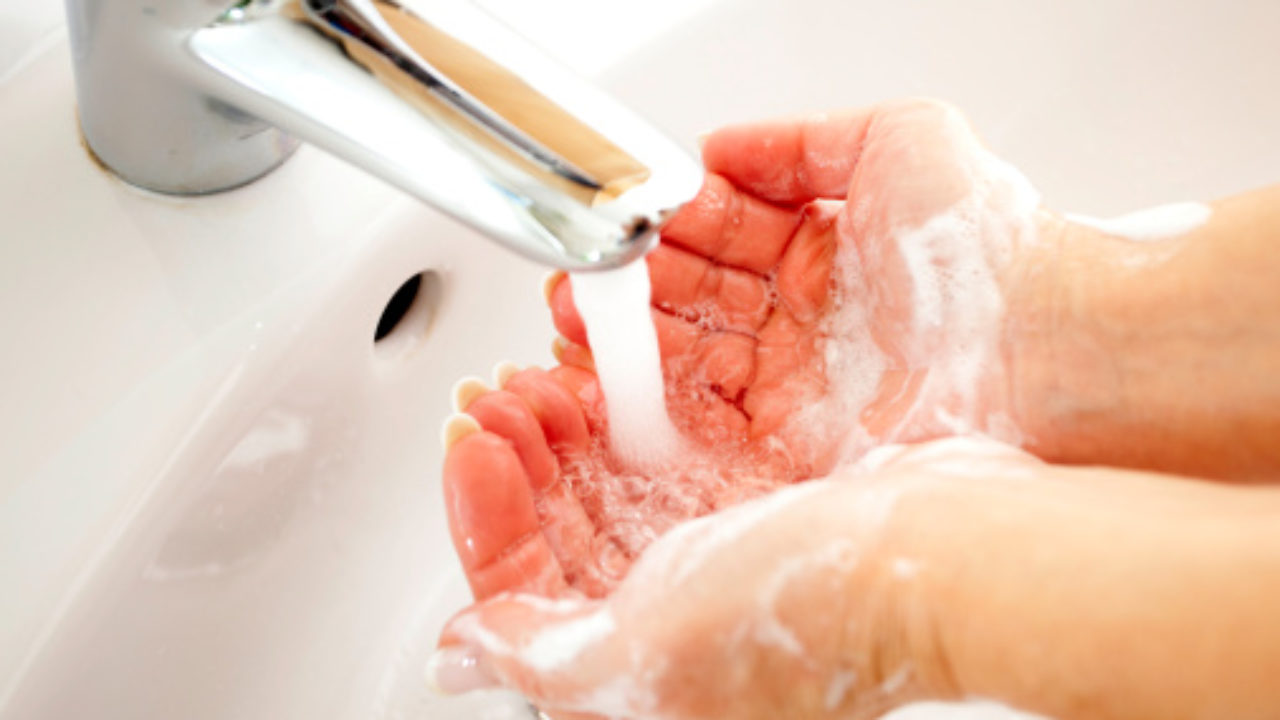Beyond the formal rituals that play an important role in our spiritual lives, the simple ones that are part of daily life help us through the day. For many of us, COVID-19 has derailed these rituals. Our experience with students preparing to turn the pages of The Saint John’s Bible reminds us of the importance of rituals in challenging times.
In Search of Rituals
Washing our hands has taken on new significance these days. We are much more aware of what we last touched, where we keep the Purell, and when we should wash our hands the good old-fashioned way—with soap and water. Remember, twenty seconds.
Given the size of the global liquid soap market, we have plenty of options for clean hands. Even before the pandemic, Grand View Research estimated this market was already $18 billion USD.
Life was simpler in my youth; our go-to soap was Lava. Yes, I’m that old.
But not as old as certain handwashing rituals that date back centuries. Our ancestors connected physical hygiene with spiritual cleanliness, and many good habits found their way into the Good Book. For Christians, Jews, Muslims, and other traditions, ceremonial handwashing can be a deeply meaningful symbol of purification.
This connection between the clean and the sacred came to mind in a way I did not expect through my experience sharing The Saint John’s Bible Heritage Edition with college students. Please bear with me while I revisit my youth.
In the 1960s, I grew up in a New Jersey neighborhood teeming with kids. As dinner approached, one of my siblings would walk out on the side porch and yell, “Dinnertime!” at the top of their lungs. The announcement could be heard in Philadelphia. When I got home, the first stop was the sink and that bar of Lava soap—my ticket to getting a seat at the dinner table.
In retrospect, the act of washing my hands was a ritual of sorts. Like a speed bump, it helped me transition from whatever knuckleheaded adventure we hatched up that day—it seems like firecrackers were often involved—to the meal with my family. As Father Ed Sthokal, SJ, who ran the Jesuit Retreat House in Minnesota for 58 years, might have observed, I was well-disposed for dinner thanks to that stop at the sink.
Back to Saint John’s and the Bible. Over the years, quite a few theology, history and fine art classes have spent time with the Heritage Edition. Before turning pages we ask students to wash their hands.* Keep in mind these are college kids with plenty on their minds: the Tuesday lunch menu; the Wednesday organic chemistry test; the Saturday football game—maybe all three. At first, they are surprised by the request; the last time they lined up to wash their hands may have been in fifth grade. But they dutifully drop their backpacks and head to the bathroom.
When they returned from the restroom, I could tell we had their attention as they slowly and carefully turned each page—from the corners as instructed. They commented on the feel of the pages and how each illumination reflected light in different directions. I also noticed that their voices dropped a few decibels, as if they were in church, as they asked questions and pointed out scenes in the Bible.
Clearly, the non-verbal, physical cue—handwashing—had the desired impact: each student slowed down and treated the volumes with great respect. And yes, their hands were clean.
There are countless books and studies written on rituals and physical cues. Across all cultures, they are a part of what makes us human and, in normal times, our days are filled with simple, informal routines which help us prepare—mentally, emotionally, and, sometimes, spiritually—for what comes next: stretching before a run; pouring a cup of coffee before the kids get up for school; or simply showering and getting dressed for work.
But in difficult times—maybe especially in difficult times—rituals can help get us through the day.
I thought of this when a friend recently reminded me of a wonderful scene from the epic war film, A Bridge Too Far. When offered a cup of tea in the middle pure chaos, Sean Connery’s character, Major General Urquahart, castigates Corporal Hancock:
“Hancock. I’ve got lunatics laughing at me from the woods. My original plan has been scuppered now that the jeeps haven’t arrived. My communications are completely broken down. Do you really believe any of that can be helped by a cup of tea?”
With typical British dryness, Hancock responds, “Couldn’t hurt, sir.”
Apparently not because the major general took the cup of tea.
These are challenging times. We recommend you take time for that cup of tea and rediscover other rituals in your life.
And one more thing: Please remember to wash your hands.
Jim Triggs, Executive Director, The Saint John’s Bible Heritage Program, Saint John’s University
*At workshops hosted by Saint John’s, we offer guidance on the proper care of these Bibles. Without fail the very first question is, “Why aren’t you using white gloves?” Most are surprised when we point to the experts who say that clean hands, not white gloves, are better for the book. Randy Silverman, from University of Utah, and Cathleen Baker, from University of Michigan, made this case in an International Preservation News article they co-wrote. In the article, they state, “Wearing gloves actually increases the potential for physically damaging fragile material through mishandling.” Like the CDC’s advice, manuscript experts recommend regular soap and water. If a sink is not nearby, Purell is a good alternative—notwithstanding Larry David’s impersonation of Bernie Sanders on Saturday Night Live, who felt 99.9% germ-free was not enough. We checked Senator Sanders’ website. He made no such claim.

